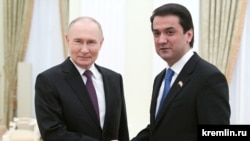When Tajik President Emomali Rahmon and Uzbek leader Shavkat Mirziyoev travel to Moscow to meet senior Russian officials, it's just another series of meetings between leaders with deep ties. But a series of recent meetings that involved their children told a different story: the succession process is on.
The Kremlin has long considered Central Asia an area in its sphere of influence. And while the European Union and China are making big pushes to gain a bigger foothold in the region, Central Asian nations still see Russia as a major player in their economies, making Moscow's approval of who leads the country critical.
"Moscow is marking its territory, and it also is sending a signal to the authoritarian presidents in Central Asia that the Kremlin would back their decision if they chose to groom their children or cronies for presidency instead of holding democratic elections. This is what sets Russia and the EU apart," a university professor in Dushanbe, who spoke on condition of anonymity, told RFE/RL.
He added that Putin "doesn't care about or want democracy in Central Asia, which is run by authoritarian regimes."
Putin met Tajikistan's "first son," Rustam Emomali, who is widely expected to take over the country when his 72-year-old father who has ruled since 1992, decides to step aside.
Emomali, 37, is the chairman of the Tajikistan's upper house of parliament, the second highest official position in the country after the president. He is also the mayor of the capital, Dushanbe.
Moscow's Critical Support
"Moscow's support is critical even before a transfer of power can take place. Russia has a military base in Tajikistan, which it has had since the country gained independence. Russia also remains one of Tajikistan's largest trading partners," said Central Asian analyst Bruce Pannier.
"If Moscow does not approve the process, it could seriously complicate the situation for Emomali Rahmon and any other contenders for power. That is why the Kremlin's support is critical -- both for the transfer of power itself and for its sustainability in the future."
Meanwhile, the elder daughter of the Uzbek president, Saida Mirziyoeva, met with Russian Prime Minister Mikhail Mishustin recently as well.
Mirziyoeva, 40, serves as the first assistant to the president of Uzbekistan, the second-highest position in the presidential administration after the head of state.
Emomali and Mirziyoeva's appointments to high government positions, their rapid rise through official ranks, and increasingly prominent profiles have fueled speculation that their fathers are setting the stage for potential succession, and the meetings in Moscow did little to dispel that notion.
If the Central Asian leaders were looking to push their successors down the path of acceptance, the Kremlin was also pushing an agenda: keeping its place in the influence pecking order.
The timing of the meetings, which focused on strategic partnership and bilateral cooperation according to official statements, came after the European Union pledged billions of dollars in future investments to Central Asia to demonstrate its long-term commitment to the resources-rich region.
Uzbekistan hosted a high-profile EU-Central Asia summit in April -- the first of its kind -- headlined by European Commission President Ursula von der Leyen and European Council President Antonio Costa.
During the summit in Samarkand, von der Leyen announced a new 12 billion euro ($13.6 billion) investment package for Central Asia through the EU's Global Gateway Initiative.
The package comes in addition to a 10 billion euro ($11.3 billion) investment plan that the EU announced in 2024 to boost transport connectivity in the region.
Von der Leyen described the EU-Central Asia cooperation as a "strategic partnership," a term unlikely to sit well with Russia, which has historically hold significant sway over the former Soviet region.
As Emomali and Mirziyoeva were being received in Moscow last week, Central Asia hosted Italian Prime Minister Georgia Meloni, who said the region "has now gained strategic significance" for Europe.
Meanwhile, China has surpassed Russia to become Central Asian countries' largest investor and trading partner in recent years as they increasingly seek to diversify their relationships and reduce dependency on Moscow.
Khidirnazar Allakulov, a leading Uzbek economy professor and opposition activist, told RFE/RL's Uzbek Service he believes that "through Saida and Rustam, Russia made it clear to the [Uzbek and Tajik presidents] that it is unhappy with their growing relations with Europe."
'Russia Has Cards'
Despite the billion-dollar investment pledges from the EU and China, many experts in Central Asia agree that Russia still has "major cards" to play to maintain its clout over the region, especially its poorer states such as Tajikistan and Kyrgyzstan.
Russia hosts millions of migrant workers from Central Asia, whose remittances are vital to keep their families afloat amid a widespread unemployment that has plagued the region for decades.
"While Europe and the United States are clamping down on immigration, Russia remains a lifeline for millions of Tajiks who almost entirely depend on Russia for income. If Russia closes its door to migrants, it can lead to civil unrest in Tajikistan and Kyrgyzstan and Moscow knows this," the Dushanbe-based professor said.













Forum